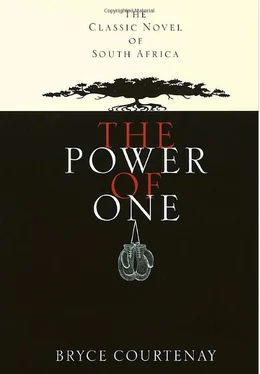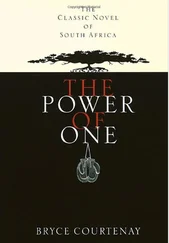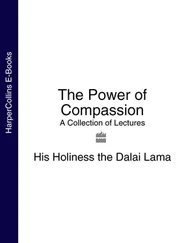Брайс Куртенэ - The Power of One
Здесь есть возможность читать онлайн «Брайс Куртенэ - The Power of One» весь текст электронной книги совершенно бесплатно (целиком полную версию без сокращений). В некоторых случаях можно слушать аудио, скачать через торрент в формате fb2 и присутствует краткое содержание. Жанр: Современная проза, на английском языке. Описание произведения, (предисловие) а так же отзывы посетителей доступны на портале библиотеки ЛибКат.
- Название:The Power of One
- Автор:
- Жанр:
- Год:неизвестен
- ISBN:нет данных
- Рейтинг книги:3 / 5. Голосов: 1
-
Избранное:Добавить в избранное
- Отзывы:
-
Ваша оценка:
- 60
- 1
- 2
- 3
- 4
- 5
The Power of One: краткое содержание, описание и аннотация
Предлагаем к чтению аннотацию, описание, краткое содержание или предисловие (зависит от того, что написал сам автор книги «The Power of One»). Если вы не нашли необходимую информацию о книге — напишите в комментариях, мы постараемся отыскать её.
The book is made to movie with the same name.
The Power of One — читать онлайн бесплатно полную книгу (весь текст) целиком
Ниже представлен текст книги, разбитый по страницам. Система сохранения места последней прочитанной страницы, позволяет с удобством читать онлайн бесплатно книгу «The Power of One», без необходимости каждый раз заново искать на чём Вы остановились. Поставьте закладку, и сможете в любой момент перейти на страницу, на которой закончили чтение.
Интервал:
Закладка:
To Mango Cobett’s credit, the detention essays Hymie and I wrote on the Crimean War shared the history prize that year. Miss Bornstein’s evidence was too conclusive.
With her weekly letters, some of them up to twenty pages, Miss Bornstein had the happy knack of instigating a line of reasoning which would stimulate us both. We’d rush to the school library to follow its course. By the time we were in form three we were fairly skilled researchers and were given permission to spend Wednesday afternoons at the Johannesburg Public Library.
Form three was a big year for us. It was the year the boxing team lost the wooden spoon and also the year we published, with the help of a typist and the Gestetner machine in Hymie’s father’s carpet emporium, The Miss Bornstein School of Correspondence Notes. Results fully guaranteed or your money back. Peekay & H. S. Levy. 5/- . There were two books, one for form one and the other for form two.
Hymie and I had argued furiously about the price. Five shillings was outrageous when a science textbook cost only two shillings.
‘If we charge what it appears to be worth we’d be lucky to get sixpence,’ he admitted. ‘Good business is when people perceive something to be valuable, and the best way to encourage this perception is by guiding their thinking.’
‘You mean by charging outrageously?’
‘Now wait a mo, Peekay, that’s not quite fair. Value for money is when the customer is satisfied that he has made the right purchase decision. Or do you disagree?’
I was forced to agree. ‘Well then, what are we promising with the Miss Bornstein School of Correspondence Notes , for form one and two?’
‘The promise is on the cover, but the bloody promise holds good whether we charge them sixpence or ten bob.’
‘Not so. A five bob price tag means at least two things: that the information in the notes is important and rare and that by following it, success is guaranteed. The second promise is convenience, all the information they need is between two covers, they don’t have to schlep through a dozen textbooks, the authors have done all the mental legwork for them. If we charged them sixpence they wouldn’t value the book and so it wouldn’t work for them.’
‘Shouldn’t we dress them up a bit? For two bob a copy we could probably afford to have them printed with a hard cover. At least that way the value would be perceived to be better?’
Hymie looked at me in astonishment. ‘Peekay, are you mad? Do you want to kill business in one year?’
‘What do you mean?’
Hymie picked up a copy of our textbook and holding it by one corner he shook it violently. The staples in the centre margin gave way and the pages flew apart.
‘There you are, look at that! They’re rubbish, we’ll never get away with this,’ I protested.
‘Bullshit, they’re perfect, they’ll only just hang together for one year. If we have them properly printed and bound the guys will sell them at the end of the year to the incoming form. Where would our business be then?’
Hymie was right, despite the price there wasn’t a kid in either form who didn’t purchase a copy and no one asked to have their money refunded. We were a good business combination with the added advantage of being generally popular; in particular, my ability in the boxing ring and, to a lesser degree, on the rugby field created quite a large following among my peers. Doing business with the Bank when you were broke became the norm for both day boys and boarders, so that every time we went out into another business venture the reception we got was usually pretty good. We referred to this accumulation of goodwill as our ‘Image’, a word I discovered in an American book on business practice and which had not then gained the currency it enjoys today.
I must say, while Mango Cobett was a bit of a buffoon and a terrible snob, Singe ’n Burn, the head, had taken care to staff the school with liberal thinkers. He was less interested in turning out what he referred to as ‘the private school product’ than he was in encouraging individuals to emerge. He would refer to his idealised person as a Renaissance man. A boy who delighted in learning for its own sake, the inspired amateur in the gifts of the body and the spirit. The complete man, superior by virtue of his curiosity and the careful nurturing and harvesting of his gifts. A man who was modest and unassuming because he had no need to hide his thoughts or his deeds from others, nor had he the need to seek their approval.
Singe ’n Burn was an Englishman coming to the end of what is usually referred to as a distinguished career. To parents he represented all the values of the English public school system, coming as he did from Winchester where he had been a senior house master. For the board of governors he epitomised a system of privilege which they held in great esteem and desired him to emulate as faithfully as possible.
In his twenty years as headmaster of the Prince of Wales School Singe ’n Burn never quite came to terms with the wealthy South African schoolboy. In a curious way the boys shared the belief in their social superiority with their English public school counterparts, though perhaps the basis for this superiority was different.
In the first instance, like all white South Africans, English and Afrikaans, they believed that God had ordained their superiority as white men. To this was added their proxy Englishness and their absolute belief in the right of wealth and privilege. Perhaps, after all, not so different from their English cousins.
Singe ’n Burn’s pupils came to him with minds already narrowed, bigots with their dislike and distrust of the Afrikaner intact. Among them was the unspoken belief that they were the intellectually and culturally superior of South Africa’s two white tribes. To this was added their spoken belief that they were of a higher species than the blacks. This corruption of the spirit had taken place in the cradle and the task of driving the racist out of the boy was fruitless. St John Burnham was forced to take in largely shallow minds to be fattened with sufficient information to pass the matriculation exams. Alas, the potential for a Renaissance man to emerge from this intellectual scrubland was severely limited.
Yet for twenty years Singe ’n Burn had kept his dream alive. While most of the boys from the Prince of Wales School were interchangeable with the product of any of the private schools in South Africa, that is, equipped for a society where money and social position were important, he kept for himself just six boys each year. They were the raw material for his Renaissance men, a handful of brilliant boys who were known as St John’s People, pronounced ‘Sinjun’s People’. These boys were selected in form three for special tuition under the direction of Singe ’n Burn, who elected to neglect the many for the precious few. Sinjun’s People were the roses amongst the tangle-weed and the school’s considerable reputation as a nursery for the country’s future leaders had been built on these half-dozen carefully nurtured young minds brought to flower in Sinjun’s hothouse.
Brains alone did not qualify a boy to be one of Sinjun’s People, though intellect played a significant part in the training to come. ‘It is the spirit of the boy, an unselfconscious ability to maintain his status among his peers while remaining true to himself in his beliefs, opinions and actions,’ is how Singe ’n Burn would explain it at the first headmaster’s assembly at the beginning of each year.
There was always a great deal of speculation in form three and, indeed, among the rest of the school when the election of Sinjun’s People took place just prior to the Easter break.
I had prepared myself in my old way for a disappointment and had I not been among the chosen six it would hurt my pride enormously but I knew I would survive. The betting on me being included was pretty high. But I didn’t share this general confidence, not for reasons of false modesty, but because of my boxing. While the boxing team had given the school a new status, compared to cricket and rugby it was a sport of small importance. Several of the masters considered it unsuitable for a school of our reputation, and but for Darby and Sarge it would probably have been phased out. I had maintained my position as one of the brains of the school but had never left any doubt that boxing came first in my immediate ambitions. I was certain this would count against me. In my final interview with Singe ’n Burn he had noted that my boxing appeared to come first, ahead of my competence as a musician and as a promising young scholar. ‘Your boxing? Is this an obsession with you, Peekay? Where do you propose to take your skill? I must say it seems an unlikely future pastime for a gentleman, even though Lord Byron was said to have been a talented boxer.’ When I replied that I intended to be the welterweight champion of the world his eyebrows had shot up and he had looked at me over his steel rimmed spectacles. ‘Hmm,’ was all he said by way of reply.
Читать дальшеИнтервал:
Закладка:
Похожие книги на «The Power of One»
Представляем Вашему вниманию похожие книги на «The Power of One» списком для выбора. Мы отобрали схожую по названию и смыслу литературу в надежде предоставить читателям больше вариантов отыскать новые, интересные, ещё непрочитанные произведения.
Обсуждение, отзывы о книге «The Power of One» и просто собственные мнения читателей. Оставьте ваши комментарии, напишите, что Вы думаете о произведении, его смысле или главных героях. Укажите что конкретно понравилось, а что нет, и почему Вы так считаете.












